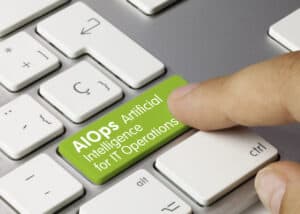
AIOps will enable the use of network analytics to enhance the customer experience for use cases such as energy efficiency improvement, network planning, and roaming cost reduction.
The telecom industry is at a turning point: many communication service providers (CSPs) continue to sell connectivity as bandwidth demands increase and average revenue per user (ARPU) decreases, while others begin to take full advantage of 5G and expand their value proposition.
As pressures around 5G cost, scale and quality-of-service accelerate, CSPs are challenged to quickly change to new operational and business models or attempt to succeed with cost-cutting measures alone.
5G is not just another typical industry update like earlier access generations. It is the intersection of groundbreaking technologies such as edge computing, artificial intelligence (AI), machine learning (ML), the cloud, and the Internet of Things. Further, CSPs face urgent pressures to strengthen their value proposition in the digital ecosystem as hyperscalers push deeper into the telecom space.
To tackle these demanding dynamics and achieve their networks’ actual value, CSPs seek trusted partners that can guarantee intelligent, secure operations to simplify network complexity and monetize 5G services. Making use of automation and AI to respond accurately to business intent will be foundational in achieving each of these goals.
See also: AIOps 2.0: Making Actionable Intelligence Actually Actionable
The Balance of AI and Automation in Operations
CSPs’ operations are impacted by digital transformation – especially operations support systems (OSS) and business support systems (BSS). A key component to OSS/BSS upgrades is automation, which is why CSPs continue to invest in automation software for operational efficiencies and agile service delivery.
AI in operations (AIOps) serves as a vital step towards more autonomous networks. In today’s industry, CSPs are determining the best approach to integrating AIOps and other intelligence techniques to scale proof of concepts and trials successfully.
In the telecom industry, AI is often considered a new, shiny technology for CSPs. However, integrating data analytics and other intelligence techniques into network operations is not new for CSPs. In fact, for a while now, CSPs have been using AI/ML to optimize operations and support essential use cases. Root-cause analysis, anomaly detection, and alarm pattern recognition are clear examples of how intelligent, secure automation embeds data engines that are powerful enough to perform advanced tasks and are not explicitly AI-driven.
As it currently stands, CSPs can create closed-loop environments and swiftly repair issues by correlating network performance events using intelligent and automated operations. However, CSPs continue to strive to become more proactive and prescriptive around network faults—which is where AIOps becomes useful.
AIOps brings value to CSPs by leveraging all the events in the network. They use them to predict the future and preemptively prevent issues. Taking this one step further, AIOps will also enable CSPs to use network analytics to enhance the customer experience overall for use cases such as energy efficiency improvement, network planning, and roaming cost reduction.
When AI and automation collaborate harmoniously, network performance is better optimized—enhancing customer experience to a level CSPs have not been able to offer before. AIOps also better secures customer data and further drives intent-based automation, enabling CSPs to establish a firmer position in the increasingly open digital ecosystem.
AIOps: Helping CSPs meet three critical areas to growth
CSPs become more valuable as they grow beyond offering traditional connectivity services. Therefore, it is important to digitalize and expand their value proposition, despite facing sustained pressure to manage costs.
Nonetheless, CSPs can apply AIOps to three main challenges they face around security, automation, and monetization.
Securing the network is fundamental to gaining long-term customer trust. CSPs are entrusted with massive sums of sensitive data. That said, 5G will evaluate their capabilities to the limit as the explosion of IoT devices, migration to the cloud, network disaggregation, and the emergence of new malware open new ways for networks to be exploited. Modern approaches to security, centered on a zero-trust mindset, is necessary. In this vein, AI-enabled automated security will be key as it can detect threats as soon as they emerge and deploy measures to contain threats in real time.
Automating network and service operations enables CSPs to boost cost efficiencies and business success in the 5G world. Automation is mission-critical for building personalized solutions for individual customers as it can interpret customer intent and drive forward necessary business processes like ordering, inventory management, and more. Additionally, automation can cost-effectively collect, analyze, and present data for insight-type services. It will also handle transactions, charging, and metering at scale for API-based revenue streams.
Monetizing services bring significant value-add around new revenue growth. Automated operations provide a solid foundation to seamlessly roll our new services on top of a 5G network and unlock new revenue. This could include targeting vertical/industry use cases or turning toward emerging opportunities in the metaverse. Either way, monetizing the network requires integrating capabilities, like charging and mediation, with AI and analytics.
AIOps allow CSPs to secure their customers’ data and gain their trust, which will drive intent-based automation for better business outcomes and enable the monetization of current and future 5G investments. By using this strategy to deliver automated intelligence everywhere across the network, CSPs will be able to secure a stronger position in the rising open digital ecosystem.





























